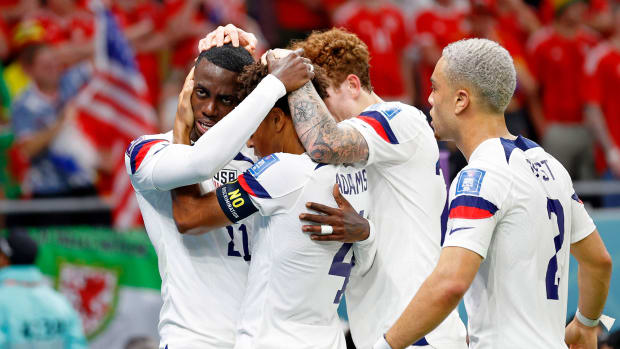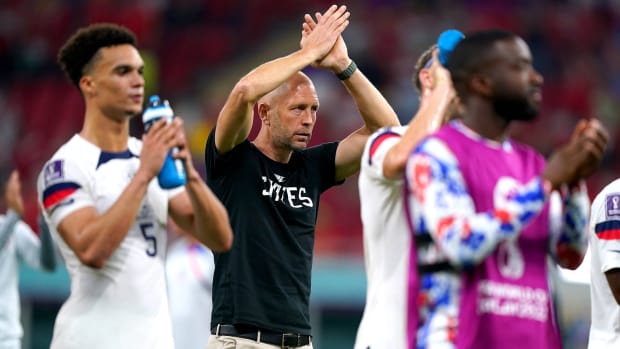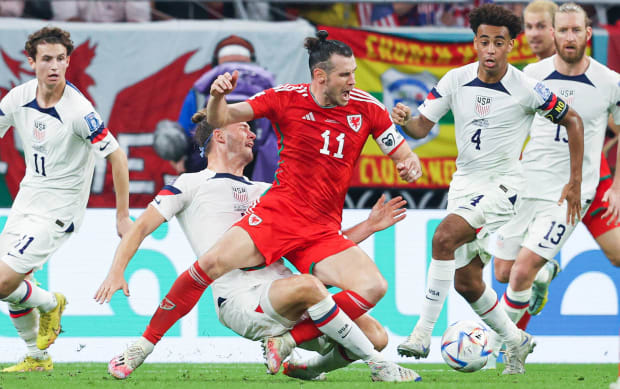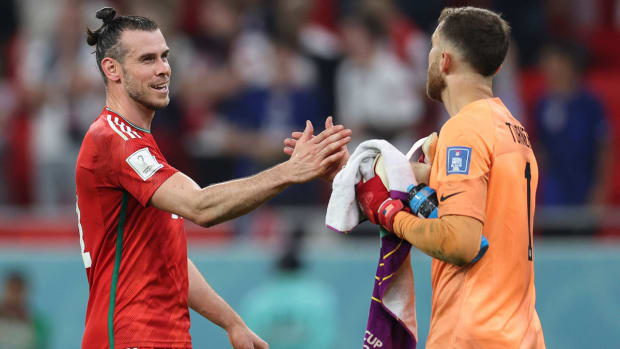AL RAYYAN, Qatar — For certain, there’s talent on this young U.S. men's national team. The starting lineup for Monday’s World Cup opener here at the Ahmed bin Ali Stadium was testament to the quality and progress made by a promising generation.
It included champions and cup winners, and men hailing from clubs in four of Europe’s top five leagues. It was anchored by the cohort that’s energized the global transfer market for U.S. players and which believes firmly that it can “change the way the world views American soccer.”
There’s also inexperience. The U.S. roster is the second youngest in Qatar. All 11 of coach Gregg Berhalter’s starters against Wales were making their World Cup debut, and only one had ever contested a competitive international match against a country from outside Concacaf. Taking the lead at a World Cup requires technique, skill, and confidence. And the U.S. deserved theirs. Tim Weah’s exquisite 36th-minute goal punctuated a dominant first half.
But holding it requires grit, patience and savvy. The Americans almost surely acquired more of those qualities on Monday. But the 1-1 draw against the Dragons—sealed with veteran star Gareth Bale’s 82nd-minute penalty kick, is set in stone. Experience isn’t useful in hindsight. All the U.S. can do is learn and look forward to England and Iran.

Sipa USA/USA TODAY Network/Imago Images
“I think [we’re] a little disappointed just with the nature of how the game played out, having a great first half, getting the first goal and then being in a position with less than 15 minutes left to walk away with three points,” center back Walker Zimmerman said following the match. “It would have been amazing to get three. We’ll take the one, but just with the nature of the game, it feels like we could have deserved a little bit more.”
Midfielder Brenden Aaronson, who entered in the second half for Weston McKennie, said the mood in the postgame locker room was “disappointed.”
“Gregg came in and of course you gotta [lift our] spirits a little bit because it was good game. But disappointed at the end of the day, because three points were there and we could have taken them,” he continued. “You definitely have to experience these type of games. I don’t want to say ‘experience them’ because you want to get the result.”
This may be Wales’s first World Cup in 64 years, but green is just one of the trim colors on its kit. Eight men on the Welsh roster were part of the group that went to the Euro 2016 semifinals and more took part in the second-round continental campaign last summer. Europe is the most competitive region in the sport by far, and simply qualifying for the World Cup from there can be a badge of honor (just ask Italy). It's no accident that European sides have won the past four World Cup titles and accounted for 11 of the past 12 medalists. And it’s no coincidence that the U.S. is 1-11-6 in World Cup matches against UEFA teams in the modern era (since 1990), and now winless in 10 since stunning Portugal in 2002.
A relentless diet of Concacaf opposition since Berhalter took over in late ’18—both the pandemic and international scheduling conventions are to blame—has left this U.S. group with next to no chance to see teams like Wales up close, or to play together in matches with these stakes or demands.

Mike Egerton/PA Images/Imago Images
The Americans didn’t fear Wales. As captain and Leeds United midfielder Tyler Adams said, “We played against a lot of these guys week-in, week-out.” The U.S. kicked off on the front foot. But this late-night game played before 43,418 in the suburbs of Doha was a very different sort of stage. It was the U.S. that was reacting in the latter moments, and it was the U.S. that made the mistake that changed the result. Wales made the right adjustments, found its way into the match and, thanks to its cunning captain, earned the draw.
“I think that's just sometimes how the game flows in big games,” said goalkeeper Matt Turner, who made the save of the match on a leaping, 64th-minute parry of Ben Davies’s header.
“Sometimes you can play a little more carefully when you have a goal lead,” he continued. “Physically we didn’t set the tone the way we did in the first half, in the second half. And that allowed them to sort of build into the game.”
The U.S. was first to every ball and the first to occupy every space in the opening 45 minutes, as the Dragons sat so deep it looked like they thought they were playing Barcelona circa 2011. Christian Pulisic found his rhythm pinching inside and was dangerous on the dribble. It was his beautiful run and through ball that set the table for Weah’s go-ahead goal.
“He's probably the only player on the field that can set that play up,” Adams said of Pulisic. “So that's a glimpse of what he can do.”
But the U.S. managed just the one goal as Wales’s sturdy back five limited looks in the most dangerous areas. The second-half introduction of imposing center forward Kieffer Moore allowed the Welsh to play more direct, and a more aggressive press made the U.S. work harder to advance the ball. The Americans faded, and the game was up for grabs. And no one on the field had more experience deciding that sort of game than Bale.

TASS/Sipa USA/Imago Images
Just a couple weeks after his late, late header tilted the MLS Cup final to Los Angeles FC, Bale got the better of another opposing center back. He positioned himself to receive a cut-back cross with his back to both the goal and Zimmerman, who’d committed to the tackle. Bale, a five-time Champions League winner, then smashed his penalty perfectly past Turner.
World Cup 2022: Schedule and TV coverage.
“The ball gets down to the endline. I see it get cut back. At that point, I'm dropping down and on the way to step out through the ball,” Zimmerman explained. “Don’t see Bale come across and I think it was one of those [players] where he probably just puts his leg not for the ball, but to try and get in the way of me hitting the ball. So I kind of went through him and I think I still got the ball, but [it's a] clever move.”
Turner said, “Any time you leave your feet in the penalty area it’s a risk. I think the striker’s done well.”
The U.S. didn’t deflate and pushed for another goal, but it was Bale who looked like he was eyeing a jaw-dropping second. Turner was far off his line when the ball fell to Bale at midfield, and it looked like he was considering a long-distance bid. Just then, substitute U.S. midfielder Kellyn Acosta committed a yellow-card foul from behind. It was an ugly, nerve-wracking play, but perhaps a good sign—there was some game-saving savvy.

Pan Yulong/Xinhua/Imago Images
The road ahead is complicated. On Friday the U.S. meets England, easy 6-2 winners over Iran earlier Monday. There’s now a bit more pressure on the Americans to avoid defeat, although the point earned against Wales isn’t a bad omen. Every time the U.S. has won or tied its World Cup opener (1930, 1994, 2002, 2010, 2014), it’s advanced to the next round. The key will be to make the most of Monday’s lessons and to utilize the experience accrued without being weighed down by lament.
“We have to play the next game and then play the game after that, and then hope we're in a position to advance,” said Berhalter, who became the first man to play for and then manage the U.S. at a World Cup. “The guys are disappointed. The staff was disappointed. But again, when you look at the effort, and we look at how we played for the majority of the game, we’ll be O.K.
“It was always going to be a tough game against England. I don't think it was ever going to change based on what happened tonight,” he added. “We're gonna have to give it our best shot. You know a point in the first game isn't the end of the world, and you just keep going and focus on the next game and try to win the next game.”
This U.S. team won’t have any trouble giving England its best shot. Its best-case scenario is that it learned a bit more about what it takes to win.
"That's football. Certain teams are gonna have certain game plans,” Adams said. “For Wales, they’re very comfortable when the opposition has the ball and they're just waiting for a moment to counter and they have big, big players that can step up in big moments, as we saw today.
“We're happy about our performance. We think that we’ve continued to make progress, which is a good thing. But we have to continue to be able to adapt within the game and manage the game.”







